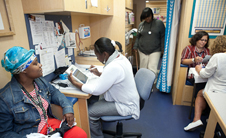A class project spurs health care mobility

As part of a spring semester service-learning course, Northeastern University graduate students designed a community-based intervention strategy for expanding a mobile health-care clinic called the Family Van into East Boston.
The Family Van — a nonprofit program supported by Harvard Medical School —currently offers free, curbside health screening, monitoring and motivational coaching to some 5,000 yearly visitors from Boston’s Roxbury, Dorchester, Hyde Park and Mattapan neighborhoods.
In May, the van received funding from the Boston Scientific Foundation to expand its reach. The graduate students’ proposal will serve as the basis for development in East Boston.
The proposal included increasing the number of bilingual health-care works who serve clients; establishing a young adult advisory board aimed at promoting the benefits of mobile health care to young Latinos; and forming partnerships with community organizations and stakeholders.
The goal is to overcome cultural and financial barriers to health and health care. In East Boston, some 10 percent of residents are uninsured and roughly 20 percent live in poverty. Many in the community’s robust Latino population are foreign-born and consider English a second or third language.
“Our goal was to increase preventative health-care services among East Boston residents and promote health awareness and health-seeking behaviors in young adults,” said Giselle Bonzi, a second-year student in the Master of Public Health program who helped develop the proposal in a course called “Race, Ethnicity and Health.”
The experiential learning opportunity, she said, has contributed to her understanding of the importance of community engagement. “This project has provided me with a model for how academic researchers can actively engage and positively affect their community through effective partnerships,” she said.
“It was particularly powerful to take what we learned in the classroom and be part of something that will hopefully have a positive impact on people’s lives.”
Improving overall health and well being is more complicated than simply mandating health insurance coverage, noted Mary Sharon Kaminski, another second-year student in the program.
As she put it, “Even though Massachusetts residents are covered by state-run health insurance, there are many other barriers to care that are addressed by the Family Van.”
Hortensia Amaro, distinguished professor of health sciences and of counseling psychology in the Bouve College of Health Sciences, and director of the Institute on Urban Health Research, taught the service-learning course. She praised its value.
“Grant writing is an essential skills that our MPH students will need in their future jobs as public health professionals,” she said.
Caterina Hill, the research and evaluation program manager for The Family Van, who called the partnership a “win-win,” was particularly impressed by the students’ professionalism.
“They treated this project like a job,” she said. “They valued being able to put into practice what they learned in the classroom.”